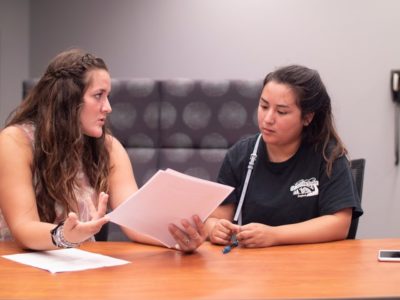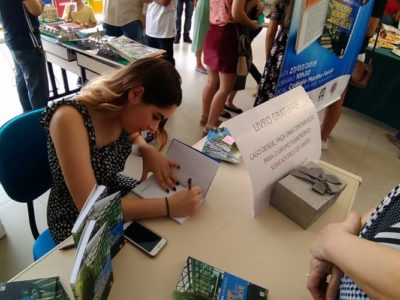About four years ago, I took my first college tour at the University of Maryland. One of my clearest memories is of standing outside of Tawes Hall and listening to the tour guide talk about the Writing Center. He described it as a place where students could take their papers to a team of other students who would edit your work. As a budding English major, I was intrigued.
What better way to sharpen my skills and get one foot into the editing world?
Then I became an actual student at the University of Maryland. As soon as applications for Writing Center internships came out, I threw my name into the running and managed to enroll in the class the next semester.
On the first day of training, the professor stood in front of the class and asked, “How many of you want to edit?” Almost everyone raised a hand. He continued, “Well, this is not an editing job. You are training to be tutors, not editors.”
Honestly, I was a little disappointed. Tutor, to me, sounded like it involved too much teaching. I hoped that my time at the Writing Center would help me decide if I wanted to be an editor after I graduated. I certainly didn’t want to be a tutor or a teacher after college. For half a second, I thought about dropping the class. And I’m so glad I didn’t.
It turns out that being a tutor has none of the student-teacher dynamic that I pictured. Instead, the tutee and tutor spend time brainstorming, asking questions and doing research to make the paper better.
The Writing Center isn’t a place you can take your paper to have it edited and turn it in grammatically flawless. It’s a place where students can collaborate with their peers and make themselves better writers.
On my first day on the job, I felt really nervous. I couldn’t help but make myself feel totally responsible for the tutee’s grade. I worried that I’d give someone bad advice, ruin their paper, make them fail their class and destroy their entire academic career.
Fortunately, tutoring doesn’t work like that. The same way a great piece of advice won’t set them up for a lifetime of As, a bad piece of advice won’t make them fail a class.
The goal for these 30-minute sessions in my little cubicle can’t be to save papers and resurrect GPAs. My time at the Writing Center has been one of the biggest learning experiences of my college career, and this was just one of many lessons I’ve learned as a tutor.
Check out a few more of the lessons you’ll learn at a writing center.
1. Reading Out Loud Works
Reading out loud is really powerful. I think everyone, no matter where they are in the writing process, should read their work out loud. It really helps you to catch grammatical mistakes, and tell whether or not it “flows” well.
Reading out loud also helps you to take ownership of your work. When you speak, you interact with your paper in a totally different way. The paper becomes yours, not just something you’ll eventually hand to your TA. Your little quirks, habitual mistake and unique writing voice all get brought to the surface.
https://www.youtube.com/watch?v=4HgUBi16MtE
2. Communication is Key
Being a tutor at the Writing Center has also made me a better communicator. Many days, I work with people who’ve learned English as a second language and people who come from completely different backgrounds from me. This job gives me the opportunity to see the world from so many different people’s point of view.
Similarly, the Writing Center taught me how to communicate better in my own writing. After reading hundreds of other people’s papers, I’ve learned how to tell if my own papers have a clear thesis or a logical organization. It’s easier for me to put myself in a readers’ shoes because I’m in those shoes so often.
3. Grammatical Mistakes Aren’t That Important
One of the biggest things people want to work on when they come into the Writing Center is grammar. And I get it. A paper riddled with typos and grammatical errors really give off the impression that the writer hasn’t bothered to edit their work.
But I think that organizational problems can be even worse. Typos may be distracting, but they usually won’t keep the reader from understanding your paper’s thesis. Organizational problems can leave a reader lost and confused, still struggling to get the point three paragraphs in. Grammatical mistakes aren’t quite as important as we think they are.
4. Science Papers Are Interesting, Too
During my time as a tutor, I’ve read dozens of papers on more topics than I ever could have imagined. I’ve learned about bioengineering, environmental justice, art history, dentistry and everything in between. I’ve learned more about STEM topics in the Writing Center than I have in any of my classes.
5. People Are Better Writers Than They Think They Are
At least once a week, someone comes into my cubicle saying, “I’m a bad writer.” It’s never true. Everybody is able to put their thoughts to words in clear and creative ways. Some people need a little bit more time and effort to get to a place where they’re comfortable with their writing, and that’s ok. That extra effort isn’t indicative of a “bad writer.”
I am now in my third semester as a tutor at UMD’s Writing Center. I can honestly say that I’ve never had a bad day at work. Every day brings a new person, a new paper and a new conversation into my little cubicle. I still have a ton of lessons left to learn, and I’m happy to learn them as a tutor—not an editor.



















